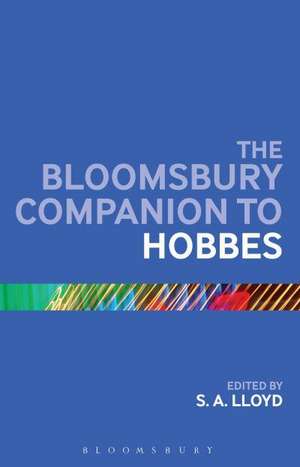The Bloomsbury Companion to Hobbes: Continuum Companions
Editat de S. A. Lloyden Limba Engleză Hardback – 2 ian 2013
Preț: 936.60 lei
Preț vechi: 1665.43 lei
-44% Nou
Puncte Express: 1405
Preț estimativ în valută:
179.23€ • 185.18$ • 149.09£
179.23€ • 185.18$ • 149.09£
Carte disponibilă
Livrare economică 26 februarie-12 martie
Preluare comenzi: 021 569.72.76
Specificații
ISBN-13: 9781441190451
ISBN-10: 1441190457
Pagini: 368
Dimensiuni: 157 x 236 x 30 mm
Greutate: 0.66 kg
Ediția:New.
Editura: Bloomsbury Academic
Seria Continuum Companions
Locul publicării:London, United Kingdom
ISBN-10: 1441190457
Pagini: 368
Dimensiuni: 157 x 236 x 30 mm
Greutate: 0.66 kg
Ediția:New.
Editura: Bloomsbury Academic
Seria Continuum Companions
Locul publicării:London, United Kingdom
Caracteristici
Thoroughly comprehensive, includes ten specially commissioned sections on every aspect of Hobbes's work and thought.
Notă biografică
S.A. Lloyd is Professor of Philosophy, Law and Political Science at the University of Southern California, USA. She is the author of Ideals as Interests in Hobbes's Leviathan (CUP, 1992) and Morality in the Philosophy of Thomas Hobbes (CUP, 2009).
Cuprins
Introduction / 1. Life and Times: Childhood - Civil War - Education - Historical context - Influences - Patrons and friends - Works / 2. Method: Definition - Experience - Experimentation - Game Theoretic Interpretations - Geometry - Logic - Observation - Reasoning - Resolutive-compositive method / 3. Language:Absurdity - Definitions - Indexicals - Meaning - Names and Universals - Ratiocination - Rhetoric - Uses and abuses / 4. Political Philosophy: Absolutism - Authorization and Alienation - Commonwealth - Duties of soverseigns and subjects - Equality - Laws of nature - Interest - Liberty - Monarchy and other forms of government - Obligation - Parental authority lies naturally in the mother - Private judgment - Power - Resistance and non-resistance - Rights - Social Contract - Sovereign - State of nature - Subjects - War and Peace / 5. Moral Philosophy: Appetite and Aversion - Deliberation - Desire - Duty - Egoism - Equality - Fear - Folly - Good and evil - Human nature - Law of nature - Manners - Prudence - Obligation - Right of nature - Right and wrong - Self-preservation - Small morals, distinguished - Virtue - Wisdom / 6. Religion: Anglicanism - Ecclesiology - Episcopacy - Erastianism - God - Hell - Heresy - Independency - Kingdom of Darkness - Miracles - Mohametans - Natural Religion - Presbyterianism - Puritanism - Revelation - Roman Catholicism - Salvation - Scripture - Superstition - Things Indifferent - Toleration - Trinity - Worship / 7. Law: Adjudication - Casuistry - Civil law - Divine law - Educative function of law - Equity - Good laws, defined - International law/ international relations - Judgment - Legislation - Natural law - Positive law - Revenge - Sin and Law - Crime and Punishment / 8. Science and Philosophy: Body - Cause - Liberty - Materialism - Motion - Necessity and Contingency - Optics - Passions - Plenism - Reasoning, instrumental - Space and Time - Squaring the circle / 9. Epistemology: Belief - History and historical knowledge - Knowledge - Opinion - Sensation and perception / 10. Lessons and Unsolved Mysteries: Hobbes's legacy - Hobbes and liberalism - Right to revolution - Does Hobbes's philosophy presuppose atheism? - What political forms can count as sovereign? - Is Hobbesian sovereignty obsolete in a world of global independence? / Bibliography / Index
Recenzii
An excellent resource, one that most historians of modern political thought and most contemporary political theorists will want to consult regularly.
Thomas Hobbes represents a turning point and a change of paradigm in the western political theory vis-à-vis the secular Aristotelian tradition of politics. The Hobbesian Moment has been the object of an important revival of studies in the last 30 years, notably in the Anglo-American world. The contributions of this volume draw an exhaustive map of the results of this recent research. The book is an impressive and original contribution to the contemporary Hobbesian scholarship illuminating all the important aspects of his extraordinary work.
A useful reference, with commentary, for upper-level courses on Hobbes and modern philosophy. Summing Up: Recommended. Upper-division undergraduates.
Thomas Hobbes represents a turning point and a change of paradigm in the western political theory vis-à-vis the secular Aristotelian tradition of politics. The Hobbesian Moment has been the object of an important revival of studies in the last 30 years, notably in the Anglo-American world. The contributions of this volume draw an exhaustive map of the results of this recent research. The book is an impressive and original contribution to the contemporary Hobbesian scholarship illuminating all the important aspects of his extraordinary work.
A useful reference, with commentary, for upper-level courses on Hobbes and modern philosophy. Summing Up: Recommended. Upper-division undergraduates.




